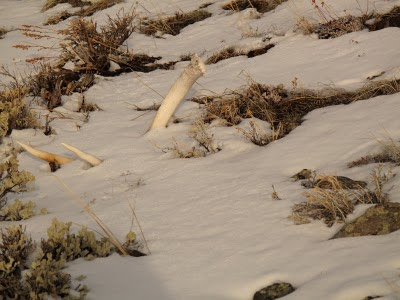From Antelope and Deer of North America by John Dean Canton Hurd and Houghton, NY 1877
After the rut in late October the mule deer herd up on the winter range until spring. In mid-February the bucks drop their antlers and, by the time the velvet covered antlers really start to come in, they'll have disappeared to where ever it is that hide until the rut of the following year. The land all around us is winter range for these large herds of mule deer. It is textbook mule deer habitat. Some of the range is protected. No vehicles are allowed from November until April in the National Forest to the south of us and on the Sheep Mountain preserve, where vehicles are never allowed, access is generally prohibited. In an attempt to preserve winter range there are covenants on the property we own and on adjacent lands which disallow recreational snowmobile use in winter and ATV use in summer. It is something.
In January I started seeing two large bucks running with a herd of does the live in the sage country on the ridge to the south of our house. In the mornings I see them down low, coming to drink from the creek, and by mid morning they browse their way back up toward the ridge tops. Some evenings I see them dramatically silhouetted on the skyline. On February 6th I photographed the deer bedded down on the ridge through the living room window. I hand held my Canon G-10 to get a shot through a Swarovski CT-75 spotting scope at 35X. The bucks were bedded down on a hilltop about a half a mile away.
A week after I took the photos Andy stopped by. He passed by the house while he was out scouting elk in anticipation of collecting antler sheds later in the year. Andy feeds his family almost exclusively on elk, goose and grouse. He spends much of the year following the elk, whether it's hunting season or not. In the spring when they drop their antlers he's right there to collect them. More than once he's told me the story of glassing a herd with some nice bulls, driving on and passing back by later in the afternoon and noticing that one of the bulls had dropped his antlers. This makes for easy pickings, but you need to be out there every day, watching and waiting.
Shed hunting has become such a popular (and competitive) pastime that the state of Game and Fish department in Wyoming have passed regulations to try to give the animals on winter range a break. The new regulation makes it a violation to collect antlers on public lands from January 1st to April 30th west of the continental divide (we're east of the divide). When he stopped in, Andy told me the mule deer had already dropped their antlers. I protested showing him the photos I'd taken just the week before. "Well, soon." he said. The next day I saw one of the bucks sitting up on the ridge top with only one antler. I tried to get a photo, but he moved by the time I got the scope, tripod and camera set up.
I've been meaning to walk up there ever since. We've had a series of spring snowstorms that have kept the ridgetops under snow. With the snow disappearing on the east and south facing slopes on Sunday P and I hiked up to the top of the ridge on Sunday. I doubted we'd find anything, when they're undisturbed the range of this herd is an area of about 500 acres of mostly heavy sagebrush country. We really didn't have time to scour the whole area but it was worth a look, and I wanted to go up to the spot where they'd been bedding during the afternoons. As we walked up the hill we pushed a large part of the herd in front of us. I shot some crude video of them. If you watch it, pay attention to the middle of the image at the beginning. The herd is so well camouflaged they are virtually invisible, and then when they start moving the landscape just comes alive.
I started looking in earnest when I got to the place where I'd seen the buck with the missing antler bedded down. We spread out a bit and I found an antler almost immediately, as far as I can tell, it was the exact spot I'd seen him in. There was another antler, partially buried in the snow, ten yards away. These were clearly the antlers from one of the two bucks I'd photographed. And then, on the other side of the ridge, I found another. This was clearly an antler from the other other buck I'd photographed, the one with shorter but much thicker antlers.
I searched for the other one of the pair but the wind was blowing and the sun was dropping and we did not find it (yet.)
The antlers have been sitting on the dinning room table for a few days now. There is a thread that stretches from the antlers on the table back through time to the memory of those bucks bedded on the hill above. That same thread connects me to the animals that I saw on the ridge this morning and see every day. Without their antlers the bucks are indistinguishable from the does now, the does are carrying the next generation of deer that are the offspring of the two bucks whose antlers sit on my table.








No comments:
Post a Comment